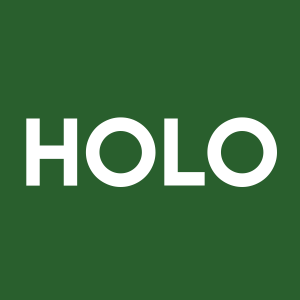MicroCloud Hologram Inc. Proposes a Quantum Secure Tripartite Computing Protocol Based on BQC, Effectively Filling the Gap in the Field of Multi-Client Collaborative Computing
Rhea-AI Summary
MicroCloud Hologram (NASDAQ: HOLO) on October 15, 2025 proposed a quantum secure tripartite computing protocol based on blind quantum computing (BQC) to protect client data in multi-client collaborative computing.
The protocol uses BQC's blindness so a remote quantum server can process encrypted quantum inputs from two or more quantum-limited clients without accessing input meaning, output mapping, or client algorithms. HOLO says it extended the method to support multi-party scenarios by adjusting data paths and server workflows, and plans continued optimization as quantum technology advances. The company also disclosed plans to invest over $400 million in related technology sectors.
Positive
- Proposed a quantum secure tripartite computing protocol using BQC
- Protocol extended to multi-party scenarios with independent client privacy
- Server cannot access clients' input meaning, output mapping, or algorithms
- Announced planned investment of over $400 million in related technologies
Negative
- No commercial deployment timeline or customer contracts disclosed
- Protocol claims are forward-looking and subject to technical and market risks
News Market Reaction – HOLO
On the day this news was published, HOLO declined 4.77%, reflecting a moderate negative market reaction. This price movement removed approximately $3M from the company's valuation, bringing the market cap to $64M at that time.
Data tracked by StockTitan Argus on the day of publication.
During the computation process, clients convert the data to be processed into a specific quantum information form and transmit it to the server through the unique processing method of BQC. While executing computational tasks, the server can only operate on the quantum information according to a predetermined process, unable to access the specific content of the client's data, including the meaning of the input data, the actual information corresponding to the output results, and the algorithmic logic employed by the clients. This approach fundamentally addresses the risk of client data privacy leakage in tripartite computation, allowing mutually distrusting clients to confidently engage in collaborative computing with the same server.
Furthermore, HOLO has extended the quantum secure tripartite computing protocol into a quantum secure multi-party computing protocol, making its applicability even broader. In multi-party computing scenarios, the number of clients may exceed two, and the protocol ensures independent privacy protection for each client's data by optimizing the application of BQC's blindness. Different clients cannot access each other's private data due to participating in the same computational task, and the server is also unable to parse the data of any individual client. This extension is not merely about increasing the number of clients but involves systematic adjustments to data transmission paths and server processing workflows while maintaining the protocol's security. These adjustments enable the protocol to stably and efficiently support multi-client collaborative computing, meeting the demands of a wider range of practical application scenarios.
HOLO's quantum secure multi-party computing protocol based on BQC not only addresses the current issues of data privacy and process complexity in multi-client collaborative computing but also lays the foundation for the practical application of quantum computing in more fields. In the future, as quantum technology continues to advance, the protocol has room for further optimization, such as improvements in handling a larger number of clients and processing more complex computational tasks. This will continue to inject new momentum into the development of quantum secure multi-party computing, driving the entire quantum computing field toward a more secure, efficient, and practical direction.
About MicroCloud Hologram Inc.
MicroCloud is committed to providing leading holographic technology services to its customers worldwide. MicroCloud's holographic technology services include high-precision holographic light detection and ranging ("LiDAR") solutions, based on holographic technology, exclusive holographic LiDAR point cloud algorithms architecture design, breakthrough technical holographic imaging solutions, holographic LiDAR sensor chip design and holographic vehicle intelligent vision technology to service customers that provide reliable holographic advanced driver assistance systems ("ADAS"). MicroCloud also provides holographic digital twin technology services for customers and has built a proprietary holographic digital twin technology resource library. MicroCloud's holographic digital twin technology resource library captures shapes and objects in 3D holographic form by utilizing a combination of MicroCloud's holographic digital twin software, digital content, spatial data-driven data science, holographic digital cloud algorithm, and holographic 3D capture technology. MicroCloud focuses on the development of quantum computing and quantum holography, and plans to invest over
For more information, please visit http://ir.mcholo.com/
Safe Harbor Statement
This press release contains forward-looking statements as defined by the Private Securities Litigation Reform Act of 1995. Forward-looking statements include statements concerning plans, objectives, goals, strategies, future events or performance, and underlying assumptions and other statements that are other than statements of historical facts. When the Company uses words such as "may," "will," "intend," "should," "believe," "expect," "anticipate," "project," "estimate," or similar expressions that do not relate solely to historical matters, it is making forward-looking statements. Forward-looking statements are not guarantees of future performance and involve risks and uncertainties that may cause the actual results to differ materially from the Company's expectations discussed in the forward-looking statements. These statements are subject to uncertainties and risks including, but not limited to, the following: the Company's goals and strategies; the Company's future business development; product and service demand and acceptance; changes in technology; economic conditions; reputation and brand; the impact of competition and pricing; government regulations; fluctuations in general economic; financial condition and results of operations; the expected growth of the holographic industry and business conditions in
SOURCE MicroCloud Hologram Inc.







